
JOURNAL OF THROMBOSIS AND THROMBOLYSIS
Scope & Guideline
Innovating research in cardiology and hematology.
Introduction
Aims and Scopes
- Thromboembolic Disease Research:
The journal emphasizes research on various forms of thromboembolic diseases, including venous thromboembolism (VTE), pulmonary embolism, and arterial thrombosis, investigating their epidemiology, risk factors, and clinical outcomes. - Anticoagulation Therapy:
It publishes studies on the efficacy and safety of anticoagulation therapies, including direct oral anticoagulants (DOACs), vitamin K antagonists, and novel anticoagulants, focusing on their use in different patient populations. - Mechanisms of Coagulation and Thrombosis:
Research exploring the underlying biological mechanisms of coagulation, the role of platelets, and the genetic factors influencing thrombotic events is a core focus, contributing to the understanding of thrombosis at a molecular level. - Clinical Guidelines and Practice:
The journal provides a platform for the dissemination of clinical guidelines and best practices in the management of thromboembolic diseases, integrating evidence-based medicine into clinical practice. - Innovative Diagnostic Approaches:
It highlights advancements in diagnostic methodologies for thromboembolic diseases, including imaging techniques and biomarkers, facilitating early detection and management.
Trending and Emerging
- COVID-19 Related Thrombosis:
A significant increase in studies addressing thrombotic complications associated with COVID-19 has emerged, highlighting the pandemic's impact on thromboembolic disease research and management. - Machine Learning and Predictive Analytics:
There is a growing trend towards utilizing machine learning and predictive analytics in identifying thrombosis risk factors and outcomes, representing a shift towards data-driven approaches in clinical research. - Personalized Anticoagulation Strategies:
Emerging research focuses on individualized anticoagulation therapy, considering genetic, demographic, and clinical variables to optimize treatment outcomes for patients. - Cancer-Associated Thrombosis:
An increasing number of studies are dedicated to understanding the mechanisms and management of thrombosis in cancer patients, reflecting the critical interplay between malignancy and thromboembolic risk. - Longitudinal Studies and Real-World Evidence:
There is a trend towards conducting longitudinal and real-world studies to assess the long-term outcomes of various thromboembolic treatments, emphasizing the importance of practical evidence in clinical decision-making.
Declining or Waning
- Traditional Antithrombotic Therapies:
Research on older antithrombotic agents like unfractionated heparin and warfarin is becoming less common as newer therapies gain prominence, leading to a shift in focus towards novel anticoagulants and their comparative effectiveness. - Generalized Risk Factors for Thrombosis:
While risk factors for thrombosis were once a major focus, there is a noticeable decline in studies addressing generalized risk factors, as researchers are now more focused on specific patient populations and their unique risk profiles. - Non-Pharmacological Interventions:
Research on non-pharmacological interventions for thrombosis prevention, such as lifestyle modifications or physical therapies, is less frequently published, likely overshadowed by pharmacological advancements. - Thrombolysis Techniques:
The frequency of studies on traditional thrombolytic techniques appears to be waning, as interest shifts towards more innovative approaches and technologies in thrombectomy and catheter-directed therapies.
Similar Journals
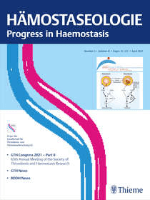
Hamostaseologie
Decoding Hemostasis: Your Source for Cutting-Edge Research and ReviewsHamostaseologie is a prominent academic journal dedicated to the field of hematology, published by GEORG THIEME VERLAG KG. With an ISSN of 0720-9355 and an E-ISSN of 2567-5761, this journal has been at the forefront of critical research and advancements since its inception in 1981, and it continues to maintain its relevance in the scientific community with a converged publication until 2024. Ranked in the Q3 quartile in Hematology for 2023, and positioned at #44 out of 137 in the Scopus Medicine Hematology category, it represents a substantial contribution to scholarly discourse. Researchers and professionals alike will find valuable insights within its pages, as it disseminates rigorous studies and reviews that address pertinent issues related to hemostasis and coagulation. While the journal does not currently offer Open Access, readers can access its valuable content through institutional subscriptions, making it an essential resource for students, clinicians, and researchers aiming to deepen their understanding of hematological science.
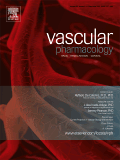
VASCULAR PHARMACOLOGY
Transforming insights into therapies for vascular diseases.Vascular Pharmacology, published by Elsevier Science Inc, is a leading journal in the fields of pharmacology and molecular medicine, dedicated to advancing our understanding of vascular biology and therapeutic interventions. With an impressive impact factor reflecting its significant contribution to the scientific community, this journal seeks to publish ground-breaking research that elucidates the molecular mechanisms underlying vascular function and disease, as well as the pharmacological impact of new therapeutic agents. The journal operates under a dual access model, allowing for both subscription and open access options, ensuring that vital research is accessible to a wide audience. As of 2023, it holds a prestigious position in the Q1 category for pharmacology and ranks well in molecular medicine and physiology, reflecting its high quality and relevance. Whether you are a researcher, clinician, or student, Vascular Pharmacology serves as an essential resource to stay at the forefront of cardiovascular pharmacotherapy and vascular biology.
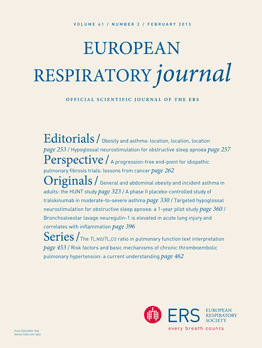
EUROPEAN RESPIRATORY JOURNAL
Pioneering Research for Better BreathingThe EUROPEAN RESPIRATORY JOURNAL, published by EUROPEAN RESPIRATORY SOC JOURNALS LTD, is at the forefront of advancing knowledge in the fields of pulmonary and respiratory medicine. With its ISSN 0903-1936 and E-ISSN 1399-3003, this esteemed journal has established itself as a leading platform since its inception in 1988, currently converging towards 2024. Ranked in the Q1 category for both Medicine (miscellaneous) and Pulmonary and Respiratory Medicine in 2023, it stands as the 3rd of 155 journals in its field, reflecting an impressive 98th percentile Scopus ranking. The journal boasts a rigorous selection of peer-reviewed articles that encompass innovative research, clinical studies, and reviews, thereby enhancing the understanding and treatment of respiratory diseases. Although it does not currently offer an Open Access option, the journal remains crucial for researchers, clinicians, and healthcare professionals committed to improving respiratory health across Europe and beyond. Join a community dedicated to groundbreaking research and advancements in respiratory medicine.
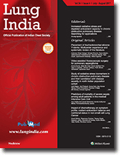
Lung India
Elevating standards in lung disease management.Lung India is a premier open-access journal dedicated to the dissemination of high-quality research in the field of Pulmonary and Respiratory Medicine. Published by Wolters Kluwer Medknow Publications, it has been forging a path in respiratory healthcare since its inception in 2004. With its impactful contributions to clinical practice and research, Lung India holds a solid position in the academic landscape, evidenced by its ranking in the Q3 quartile for Pulmonary and Respiratory Medicine as of 2023, and its Scopus rank of #99 out of 155. The journal is particularly important for researchers, clinicians, and students in India and beyond, providing a platform for the latest findings and developments in respiratory care, lung disease management, and innovative treatment methods. With a commitment to accessibility, Lung India aims to promote knowledge sharing among professionals and support the advancement of respiratory health. The journal is well-equipped to cater to a diverse audience, ensuring that vital research is readily accessible and impactful.
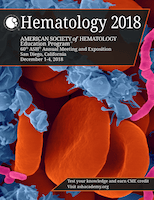
Hematology-American Society of Hematology Education Program
Navigating the Future of Hematology TogetherHematology-American Society of Hematology Education Program is a premier peer-reviewed journal dedicated to advancing the field of hematology through comprehensive educational content. Published by the American Society of Hematology, this journal plays a crucial role in disseminating knowledge to researchers, clinicians, and students in hematology and related disciplines. With an impressive Q1 status in the field, it ranks among the top journals at the forefront of hematological research, as evidenced by its 60th percentile ranking in Scopus' Medicine - Hematology category. Although it does not offer open access, the journal provides invaluable insights and educational resources from leading experts, focusing on the latest advancements, treatment protocols, and evolving understanding of blood disorders. Covering a wide range of topics, from basic research to clinical applications, this journal is essential for anyone seeking to deepen their expertise and stay informed on the latest developments in hematology. For further engagement, readers can access insightful articles published since 2001, ensuring a rich repository of knowledge for ongoing research and clinical excellence.

PHLEBOLOGIE
Unlocking the Complexities of Vascular ConditionsPHLEBOLOGIE is an esteemed journal published by GEORG THIEME VERLAG KG, serving as a critical platform for the dissemination of research in the field of Cardiology and Cardiovascular Medicine. Since its inception in 1991, the journal has consistently provided a comprehensive range of articles that explore the complexities of vascular health, offering insights into innovative treatments, diagnostic advancements, and emerging trends. Although currently not available as an Open Access publication, PHLEBOLOGIE maintains an impactful presence in the academic community, evident in its 2023 Scopus ranking as Q3 within its category and a percentile standing of 25%. Residing in Germany, PHLEBOLOGIE aims to bridge the gap between research and practice, appealing to researchers, clinicians, and students alike by fostering a deeper understanding of vascular conditions and their management.
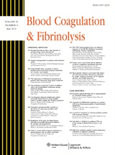
BLOOD COAGULATION & FIBRINOLYSIS
Driving Progress in Hematological TherapiesBLOOD COAGULATION & FIBRINOLYSIS, a distinguished journal in the field of hematology, is published by Lippincott Williams & Wilkins, a reputable name in academic publishing. Since its inception in 1990, this journal has been committed to advancing the understanding of blood coagulation and fibrinolysis, focusing on the molecular mechanisms, clinical implications, and therapeutic aspects of these critical processes. With an impact factor reflecting its significance within the academic community, currently ranking Q3 in both Hematology and Miscellaneous Medicine for 2023, this journal serves as a pivotal platform for researchers and professionals alike. By providing access to cutting-edge research and reviews, BLOOD COAGULATION & FIBRINOLYSIS endeavors to foster collaboration and innovation in the treatment of coagulation disorders. Interested readers can explore ongoing contributions to the field through subscriptions and institutional access options.

Research and Practice in Thrombosis and Haemostasis
Empowering research for better patient outcomes.Research and Practice in Thrombosis and Haemostasis, published by Elsevier, is a prominent open-access journal dedicated to advancing the field of hematology through high-quality research and clinical practice. Since its inception in 2017, this journal has established itself as a vital resource for researchers, healthcare professionals, and students interested in thrombosis and hemorrhage management, showcasing original research, reviews, and clinical studies. The journal’s commitment to accessible knowledge is reflected in its open-access model, allowing researchers worldwide to share their findings without financial barriers. With an impressive 2023 Scopus rank of #42 out of 137 in the hematology category and a respectable Q2 classification, it provides an authoritative platform for innovative ideas and cutting-edge developments in the field. As the journal continues to grow in stature, it aims to foster collaboration and knowledge exchange amongst professionals dedicated to improving patient outcomes in thrombosis and hemostasis.

ARTERIOSCLEROSIS THROMBOSIS AND VASCULAR BIOLOGY
Advancing cardiovascular knowledge through groundbreaking research.ARTERIOSCLEROSIS THROMBOSIS AND VASCULAR BIOLOGY, published by Lippincott Williams & Wilkins, is a leading journal in the field of cardiovascular medicine, dedicated to the advancement of research surrounding arterial diseases, thrombosis, and vascular biology. With an impressive impact factor indicative of its reach and influence, this journal occupies a prominent position in the Q1 category of cardiology, ranking 13th out of 387 in its field according to Scopus, placing it within the top 96th percentile among cardiovascular research journals. Since its inception in 1990, ARTERIOSCLEROSIS THROMBOSIS AND VASCULAR BIOLOGY has been pivotal in disseminating cutting-edge research that drives innovation and education in cardiovascular health. Although it does not operate under an open access model, the journal is a vital resource for researchers, clinicians, and students looking for high-quality, peer-reviewed articles that contribute to the understanding and treatment of cardiovascular and vascular disorders. Its commitment to rigorous scientific standards and its focus on impactful findings make it an essential publication for anyone dedicated to the field.
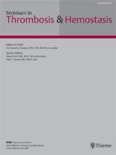
SEMINARS IN THROMBOSIS AND HEMOSTASIS
Pioneering insights into hemostatic disorders since 1974.SEMINARS IN THROMBOSIS AND HEMOSTASIS is a prestigious academic journal dedicated to advancing the understanding and practice of thrombosis and hemostasis, published by THIEME MEDICAL PUBL INC. With an ISSN of 0094-6176 and an E-ISSN of 1098-9064, this journal plays a critical role in disseminating groundbreaking research and reviews in the fields of cardiology and hematology. As of 2023, it holds a commendable Q2 ranking in both the Cardiology and Cardiovascular Medicine and Hematology categories, with Scopus ranks of #55 out of 387 and #23 out of 137, respectively, positioning it within the top percentiles of these disciplines. The journal publishes articles that bring forth innovative findings and facilitate clinical applications, making it an essential resource for researchers, healthcare professionals, and students focused on improving patient care and outcomes. Since its inception in 1974, SEMINARS IN THROMBOSIS AND HEMOSTASIS continues to evolve with the changing landscape of medical research, striving to fill the gaps in knowledge and foster an informed approach to hemostatic disorders.